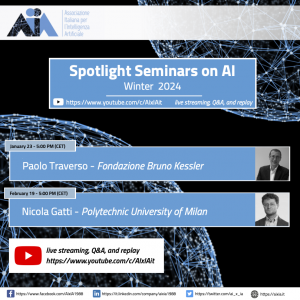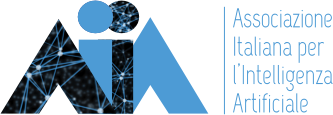Spotlight Seminars on AI – Winter 2024
 The Italian Association for Artificial Intelligence is pleased to announce the Winter 2024 program of the Spotlight Seminars on A. Theaim of the seminars is to illustrate, explore and discuss current scientific challenges, trends, and possibilities in all branches of our articulated research field. The seminars will be held virtually (https://www.youtube.com/c/AIxIAit), on a monthly basis, by leading Italian researchers as well as by top international scientists. The seminars are mainly aimed at a broad audience interested in AI research, and they are also included in the Italian PhD programme in Artificial Intelligence; indeed, AIxIA warmly encourages the attendance of young scientists and PhD students.
The Italian Association for Artificial Intelligence is pleased to announce the Winter 2024 program of the Spotlight Seminars on A. Theaim of the seminars is to illustrate, explore and discuss current scientific challenges, trends, and possibilities in all branches of our articulated research field. The seminars will be held virtually (https://www.youtube.com/c/AIxIAit), on a monthly basis, by leading Italian researchers as well as by top international scientists. The seminars are mainly aimed at a broad audience interested in AI research, and they are also included in the Italian PhD programme in Artificial Intelligence; indeed, AIxIA warmly encourages the attendance of young scientists and PhD students.
The “Winter 2024” edition features 2 seminars:
- Paolo Traverso, Fondazione Bruno Kessler
- January, 23 – 5:00PM (CEST)
- Title: Planning and Acting to Learn
- Abstract: Most current AI applications (e.g., image classification or more in general perception tasks) are based on learning models that are pre-trained on datasets available before deployment. However, in many cases, e.g., agents that operate in real-world open-ended dynamic environments, it is unrealistic to assume that all the training datasets are available at once for all possible configurations of all potential environments. AI agents should autonomously learn/adapt/extend their models by acting in the environment. In this talk, I will show how agents can automate the process of collecting training data and using them to learn their models, how they can automatically evaluate the quality of the prediction of learned models and identify the situations in which the model’s predictions are correct. I will show how it is possible to formalize such a learning task in a symbolic planning framework that can be used by the agent to autonomously plan for the learning process.
- Bio: Paolo Traverso is the Director of Strategic Marketing and Business Development at Fondazione Bruno Kessler (FBK), a Research and Technology Organization (RTO) of more than 600 people working on Information and Communication Technologies, Sensors and Devices, and Social Sciences. From 2007 until the end of 2020 he was the Director of the Center for Information Technology – IRST (FBK-ICT), one of the FBK research centers with about 350 researchers, project managers, developers, and PhD students. He joined IRST (now FBK) in 1989, after working for four years in the advanced technology groups of different companies for management information consulting in Chicago, London, and Milan where he first led the IRST lab working on software development and verification, automated planning and scheduling and then he was head of the Automated Reasoning Systems Division. In 2005, he was nominated EurAi/ECCAI fellow “for pioneering work in the field of Artificial Intelligence, and outstanding service to the AI community”. He has also been appointed as a member of the Scientific Advisory Board of the Deutsches Forschungszentrum für Künstliche Intelligenz (DFKI) since January 2019. In addition to over one hundred published scientific papers – in international journals and conference proceedings – Paolo Traverso is also co-author of two main textbooks in Automated Planning:
- M. Ghallab, D. Nau, and P. Traverso. Automated Planning: Theory and Practice. Morgan Kaufmann/Elsevier, 2004. ISBN 1-55860-856-7. Chinese translation by Yunfei Jiang at Zhongshan University in Guangzhou, China
- M. Ghallab, D. Nau, and P. Traverso. Automated Planning and Acting. Cambridge University Press, 2016, ISBN 9781107037274.
- Nicola Gatti, Polytechnic University of Milan
- February, 19 – 5:00PM (CEST)
- Title: Recent Advancements in Equilibrium Computation for Adversarial Team Games
- Abstract:This talk focuses on adversarial team games where a team of players faces another team in adversarial sequential games. The talk describes the state of the art of the techniques developed in the last 5 years, showing the progress and the paradigms studied. In particular, dimensions such as communication and computation are analyzed.
- Bio: Nicola Gatti is a full professor of Computer Science and Engineering in the Department of Electronics, Information, and Bioengineering at Politecnico di Milano. His research activities are grounded in the Artificial Intelligence area. His main achievements come from algorithmic game theory, allocation problems and incentives, algorithmic social choice theory, multi-agent learning, and online learning. His contributions to these fields range from new algorithms and theoretical results to experimental analyses, implemented systems, and innovative real-world applications of AI techniques. His research activities received several awards, including the 2011 AIxIA Marco Somalvico Award as the best Italian young researcher in AI, and the best paper award in several conferences, including the prestigious NeurIPS 2020 and Cooperative AI 2021 funded by Google Deepmind. He was elected as a EurAi Fellow (top <3% of the European AI scientists) in 2021 and awarded at IJCAI 2022, and he was elected as a Fellow of the Asia-Pacific Artificial Intelligence Association (AAIA) in 2022.
